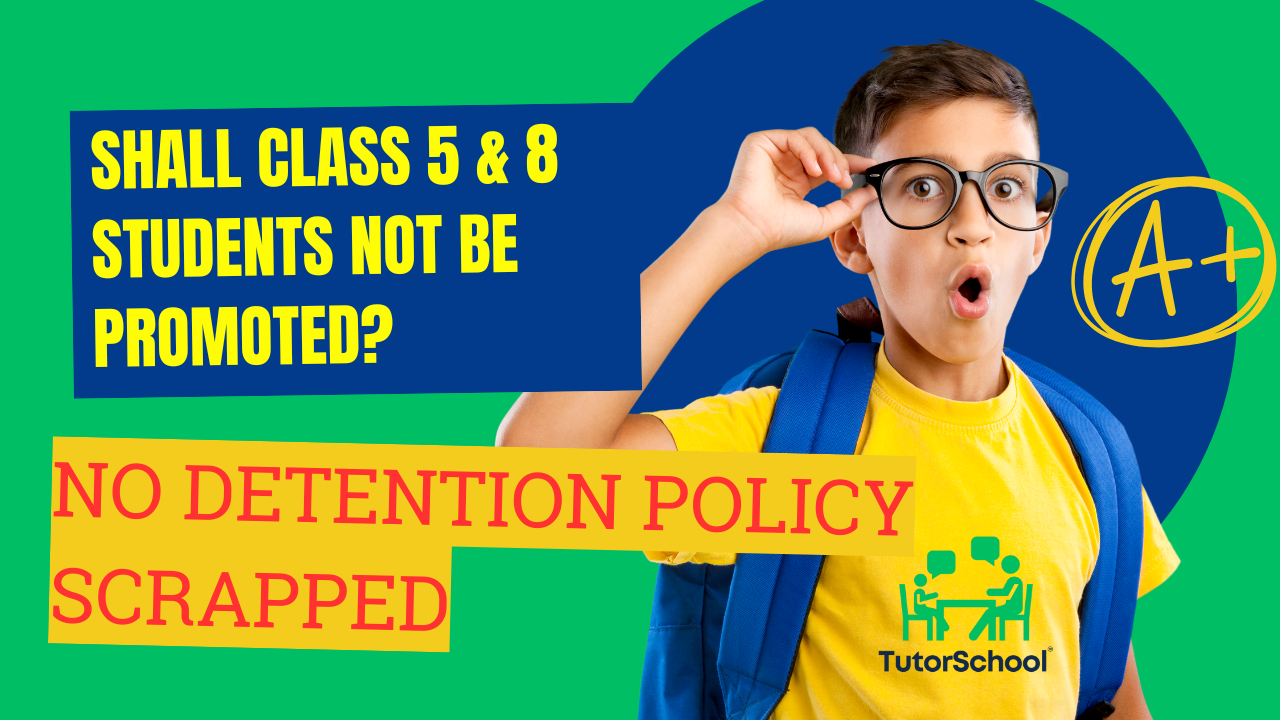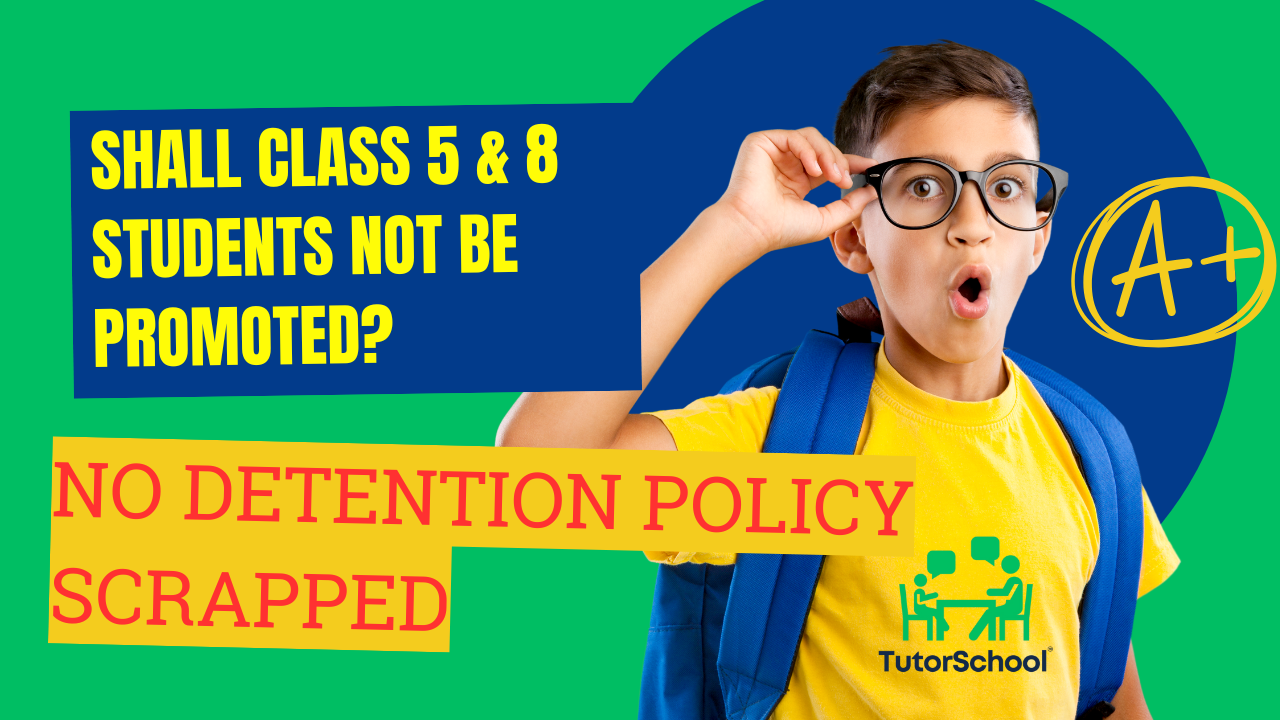Shall Class 5 & 8 Students Not Be Promoted To Next Classes?
Written by – Abhishek Kumar Ranjan (An alumnus of IIM)
Summary (What will you learn from this blog)
-
What the no detention policy was:
Introduced under the Right to Education Act (2009) to ensure automatic promotion up to Class 8, preventing failure-related stress. -
Why it was scrapped:
Reports like ASER 2022 showed declining learning outcomes—only 20% of Class 3 students could read Class 2-level text; more than 65 lakh students failed Classes 10 and 12 in 2023, pointing to deep learning gaps.
The Ministry of Education argued that automatic promotion to next class caused complacency among students and teachers. -
What the new rules say:
-
No automatic promoted to next class for failing students.
-
Failed students get 2 months of remedial teaching and a re-exam.
-
Persistent underperformance can lead to detention in the same class.
-
Remarks for students performance will be detailed, focusing on competencies, not only marks.
-
-
Impact on parents and application for promotion:
Parents can write an application for promotion in next class if failure is due to illness, personal hardship, or special circumstances, supported by documents.
Examples and templates for application for promotion are provided. -
State-wise effect:
This applies only to central schools right now—though 18 states have already ended the no detention policy. -
Pros & Cons:
Pros: Raises accountability, encourages learning.
Cons: Risk of dropouts and stress; might not solve systemic issues like teacher shortage. -
Global parallels:
US and Finland often rely on remedial support + assessment before deciding to promote or retain a student. -
Key takeaway:
Promotion in Classes 5 and 8 is no longer automatic; students must meet performance standards and take remedial exams if needed. Remarks for result of students will guide both parents and teachers in charting improvement plans.
Facts and Figures in Brief:
-
20% of Class 3 rural students can read Class 2 text (ASER 2022).
-
65 lakh students failed Classes 10 & 12 in 2023.
-
18 states & UTs have already scrapped the no detention policy.
-
Policy directly impacts 3,000+ central government schools.

The Central Government’s recent decision to get rid of the “no detention policy” for Classes 5 and 8 in schools it runs, like Kendriya Vidyalayas and Jawahar Navodaya Vidyalayas, has caused a lot of talk among teachers, parents, and students all over the country. The “Right of Children to Free and Compulsory Education (Amendment) Rules, 2024” made this change official. It changes the way students move up to the next class in central government schools.
What Was the No Detention Policy and Why Was It Scrapped?
Section 16 of the Right to Education Act (RTE) brought in the no detention policy in 2009. It said that no child in elementary school (up to Class 8) should be expelled or kept back in any class. This meant that they would automatically move up a grade and not have to worry about failing. The goal of the policy was to make sure that all kids got at least a basic education without the stress of yearly tests. It also aimed to create a stress-free learning environment.
But people started to worry that automatic promotion made students and teachers too comfortable, made them less responsible for their work, and made learning less effective.The ASER 2022 report, for instance, said that only 20% of Class 3 students in rural India could read a Class 2-level text. About 25% of young people in these areas can’t read such a text fluently in their own language. Reports say that as many as 65 lakh students failed Classes 10 and 12 in 2023, which shows that they didn’t learn the basics. These kinds of numbers made it necessary to rethink how students move up to the next grade.
How Does the New Policy Impact Students’ Promotion?
Students in Classes 5 or 8 who do not meet promotion requirements after annual exams will be given two months of extra instruction before being reexamined under the revised regulations. The student will stay in the same class if their performance doesn’t improve. However, no child can be expelled before finishing elementary school; the strategy prioritizes corrective action over punitive measures.
Key changes for student promotion:
- No promotion by default: Failure to pass exams and the retest that follows leads to a holdback.
- Specialized interventions: Teachers must mentor parents and detained students, offering focused remedial assistance and keeping track of their progress.
- Student assessments have been updated to place more emphasis on holistic development, evaluating conceptual understanding and competency rather than just memorization.
- Remarks regarding student performance: Progress reports are now more important for students’ outcomes, and teachers must give clear feedback.
Does Every School in India Follow This Now?
No, education is still a concurrent subject even though the policy is immediately applicable to more than 3,000 central government schools. States are free to decide what to do with their own schools. The no-detention policy has already been repealed in 18 states and Union Territories, but some states—like Andhra Pradesh, Maharashtra, and Uttar Pradesh—continue to enforce it. Puducherry and Haryana have not yet made a decision.
What Are the Arguments For and Against Detention?
Arguments in Favor of Detention Policy:
- Better learning results: Promoting only individuals who pass competency exams guarantees a minimum level of foundational knowledge.
- Increased accountability: Teachers and students work harder because they understand that advancement to the next class is based on merit.
- Alignment with NEP 2020: The policy backs the National Education Policy 2020’s emphasis on rigorous accountability in elementary school and competency-based learning.
Arguments Against Detention:
- Risk of higher dropout rates: Students from underprivileged backgrounds may drop out due to a fear of failing.
- Possibility of stress and stigma: Keeping students on board may have an effect on their self-worth and heighten their anxiety about tests.
- Does not address underlying problems: Critics contend that subpar results are caused by more than just automatic promotion and also by things like poor teacher preparation, socioeconomic limitations, and infrastructure deficiencies.
Role of Student Remarks and Feedback in Promotions
Remarks regarding students’ performance are crucial under the new policies, for both parents and teachers. In order to provide a comprehensive picture of the child’s development, teachers’ remarks must include not only the student’s scores but also their strengths, areas for development, and suggested interventions.
Typical comments regarding students’ performance could be:
“Needs more help with reading comprehension; shows improvement in problem-solving.”
“Remedial instruction is advised; promotion criteria have not been met.”
“Successful performance in re-exam led to promotion to next class.”
Parents are now informed of necessary actions and future academic planning by these students’ remarks.
How Can Parents Request Promotion for Their Child?
Parents can apply for their child to be promoted to the next class, particularly if the student has a strong academic record but was unable to perform well on regular exams due to illness or personal hardship. An appeal for consideration, particular justifications, and supporting documentation (such as report cards or medical certificates) should all be included in such applications.
Sample lines for application for promotion:
“I request you to kindly promote my child to the next class, considering their consistent academic record and the recent medical condition that affected their exam performance.”
What is the Connection With NEP 2020?
The National Education Policy 2020, which prioritizes mastery of competencies, inclusion, and focused intervention over general promotion, is in line with the updated detention guidelines. The goal is to identify learning gaps early on through assessments and frequent feedback so that students can get the help they need to advance.
Global Practices: How Do Other Countries Promote Students?
Remedial education and ongoing evaluation are more important than automatic promotion in countries like Finland, which promote inclusive education. Grade retention is still prevalent in the US, where students who don’t meet grade-level expectations repeat the grade while receiving thorough remedial instruction.
Statistical Insights: Why is Policy Change Urgent?
- Only 43.3% of 14-18-year-olds in India can solve division problems correctly.
- Over 65 lakh students failed Classes 10 and 12 in 2023.
- Dropout rates halved after initial no detention policy implementation—especially among marginalized groups.
Conclusion: Is Being Promoted to Next Class No Longer Automatic?
For Classes 5 and 8, the days of central government schools having no detention policy are long gone. In order to align Indian policy with competency-based approaches and international best practices, promotion is dependent on academic performance, remediation, and comprehensive evaluation.
For teachers, parents, and students, this means that involvement changes from passive annual results to proactive monitoring, focused instruction, and insightful comments regarding students’ performance. Promotional applications will now need evidence and supporting documentation rather than just conjecture.
The true test of this new strategy will be how well it strikes a balance between compassion and accountability, as well as how well schools assist both strong and struggling students in their efforts to advance to the next class in a fair and efficient manner.
FAQs
No. Students are reexamined and given more instruction. They will only be kept if they fail once more.
Indeed. Parents can review specific cases by submitting a formal application for promotion in the following class.
Of course. Teachers’ qualitative comments and feedback on students’ performance are now crucial in directing corrective measures and in promoting students.
No, expulsion is prevented by the rules; pupils are never dismissed before completing elementary school.
Subject: Application for Promotion to Next Class
Respected Sir/Madam, I request you to kindly promote my child to the next class due to [state reason: illness/personal hardship/consistently good academic record]. Kindly consider the enclosed report card/medical certificate. Your support will help my child continue his/her education uninterrupted.
Yours sincerely,
[Parent’s Name]
[Contact Details]
